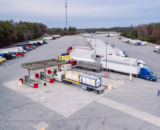New tolls on existing interstates are being mentioned more and more throughout the nation as a way to reap higher transportation infrastructure revenue “without raising taxes.” Of course, we all know that tolls are road taxes – you just pay them through the through an open window or with a transponder rather than at the gas pump.
Despite longstanding federal restrictions on tolling existing Interstates, there are many pro-toll interest groups in Washington D. C. working hard to overturn this ban and allow states to toll existing interstates. The door has already been cracked open by a pilot program that allows up to three states at a time to toll existing federal highways. These slots have been occupied by proposals in Virginia, North Carolina and Missouri, and could move to another state at any time.
The tolling industry thinks the highway funding reauthorization debate offers them an opportunity to expand the interstate toll pilot program or lift the tolling ban altogether. All businesses, large and small, that rely on the federal interstate system to survive and thrive should be concerned about this aggressive push to place tolls on existing interstate lanes. This is not simply an issue for the restaurant or gas station owner who caters to travelers and truckers. This is an issue for truck manufacturers, makers of fleet management software, truck staffing companies, tire makers, fuel management companies, and even truck washers and cleaners.
Tolls are an inefficient and ineffective mechanism for generating and collecting transportation revenue.
- A National Academy of Sciences study concluded that the administrative, collection and enforcement costs of a typical toll facility are 33.5 percent of the revenue generated.
- A study on the effects of tolls in North Carolina predicted that tolls would divert up to 36 percent of traffic to alternate routes.
- A 2009 study on the impact of potential tolls on I-80 in Pennsylvania estimated that shippers, truckers, and consumers would suffer a combined annual deadweight loss of between $8 million and $15 million per year.
To prevent new tolls on existing interstates, truckstop operators have partnered with the trucking industry, restaurants, manufacturers, highway users and many others to form the Alliance for Toll-Free Interstates (ATFI). ATFI is working to eliminate authorization for new tolls on existing interstates at the federal level. This means, in part, repealing the pilot program that allowed Virginia and North Carolina to propose tolls on I-95 in the past year, and led to costly battles in both states.
America’s Interstate Highway System is one of our nation’s most valuable commercial assets. Existing interstates should remain toll-free to preserve the unrestricted flow of goods, services and travelers on America’s highways. There are many options for funding America’s transportation system, but tolling existing interstates is the least efficient and least effective option.
To learn more about ATFI and join the Alliance visit www.tollfreeinterstates.com. It is free to join, although we hope you will contribute if it fits into your budget. The most important goal at this stage is building a broad national coalition of many members. Please add your company’s name to the Alliance and encourage your employees to join as individual members.
Subscribe to Updates
NATSO provides a breadth of information created to strengthen travel plazas’ ability to meet the needs of the travelling public in an age of disruption. This includes knowledge filled blog posts, articles and publications. If you would like to receive a digest of blog post and articles directly in your inbox, please provide your name, email and the frequency of the updates you want to receive the email digest.



